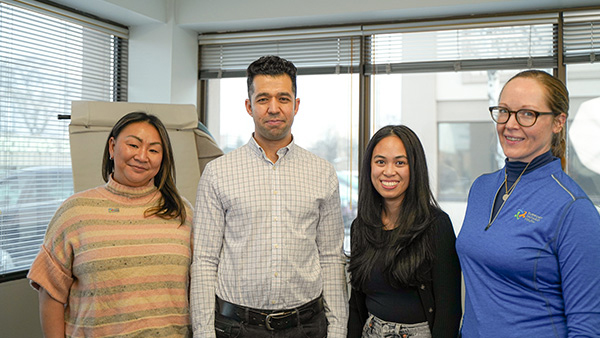Ontario’s skilled trades industry offers a pathway to success for individuals from a wide range of backgrounds but can come with challenges if navigated unsupported. This is exemplified through Haseebullah Amani’s story, an inspiring testament to resilience, determination, and the power of finding the right support network.
Haseebullah’s journey led him from working in fast-food establishments after moving to Canada to achieving success as an electrical apprentice in Ontario’s thriving skilled trades sector. His experiences highlight both the challenges and the rewards of navigating the skilled trades landscape, underscoring the crucial role of support systems like Support Ontario Youth (SOY) in facilitating success. We sat down with Haseebullah to ask him about his experiences. To watch the full interview, you can view it at: https://www.youtube.com/watch?v=zSHkpJHm7bQ.
What does the life of an aspiring electrical apprentice look like?
First of all, it’s hard to find a job to start at the beginning. Any company you go to for a job asks for experience. How am I going to get experience? That’s the difficult part for apprentices – just finding a job. Everyone wants to know if you have Canadian experience. When you start working, they offer you very low pay and ask you to do the hard jobs. You have to survive the first bit. Pay for your gas, and pay for your tools, because most places don’t provide you with tools. You have to survive until you get to the level where you are bringing value to the company.
What are some challenges that you currently face?
The big challenge that I am facing is knowledge. Lack of knowledge.
What are some of the benefits of working in the skilled trades compared to other career options?
The greatest benefit is that while you are working, you are getting paid; you earn money. If you go somewhere for work, you are focusing like in school, learning, but you are getting paid. Someone is there for you, and they show you the work and how to do it. If you make a mistake, that’s okay. They are going to teach you more and more.
What are some skills or qualities that are important for success in the skilled trades, and how have you developed these skills during your apprenticeship?
The first thing is you have to be interested in what you are doing. You have to be smart. Most skilled trades aren’t easy. They can be dangerous. You have to be smart to understand. Obviously, experience helps too.
How has Support Ontario Youth helped you during your apprenticeship?
When I got my job, I was constantly asking my boss “When are you going to register me?”. I set an alarm each week to call my boss and ask him. He said he had to find someone to register me to take those responsibilities. “I can’t do all of it. I can sign your papers”, he said. Then I heard the name Support Ontario Youth and told my boss they can register me. They can take the responsibilities. I can talk with them. I can forward the email, follow my hours. All you have to do is sign my contract. When I got registered, everything happened through SOY and they helped me a lot. I heard about SOY at the job site from my colleagues.
How do you feel about classroom learning and on-the-job training?
It’s been three years that I have been working as an electrician. For the first two years, I was following orders and didn’t really know what I was doing. I didn’t know the reason behind what I was doing, but I was doing it correctly. When I got my offer from the government through SOY to go to school, the instructor in school explained everything and those two parts came together, and it completed my knowledge. I understood this is the reason why we are doing that. At the job site, you are learning how to do the job. You go to school, and you learn the reason why you are doing it.
Some people perceive skilled trades as physically demanding or male dominated. How do you view diversity and inclusion in the skilled trades, and what can be done to encourage more individuals from diverse backgrounds to pursue careers in this field?
The spool of wire I work with is about 20 lbs. Anyone can lift that. At my job, my boss is always telling me “If you aren’t comfortable, ask for help”. I have a female co-worker who works with us. She is great. Whatever I lift, she can lift. You don’t need any specific physical abilities for this trade.
As an apprentice, how have your mentors influenced your growth and development, and what advice or lessons have you gained from them?
I don’t have any electrical background from back home, so I learned here. I have made a lot of mistakes and my journeyman, my foreman, and my boss, they teach me on the job site. Not getting mad, they just show me how to do the job. Obviously, I make mistakes, but they explain and show me how to do it right.
Lastly, if you were to give advice to someone considering a career in the skilled trades, what would you share?
I would say, first of all, look at yourself. What are you interested in? Because that’s going to be your job that you are doing for the rest of your life. Whatever field you work in, work safe, and try to learn something new. I’m not saying anybody is complete, but everybody can learn something new every day.
This Employment Ontario project is funded in part by the Government of Canada and the Government of Ontario.
For more information about Support Ontario Youth and their initiatives, please visit their website at www.supportontarioyouth.ca.








